
News
Behind the Headlines
Two-Cents Worth
Video of the Week
News Blurbs
Articles
Testimony
Bible Questions
Internet Articles (2015)
Internet Articles (2014)
Internet
Articles (2013)
Internet Articles (2012)
Internet Articles (2011)
Internet Articles (2010)
Internet Articles
(2009)
Internet Articles (2008)
Internet Articles (2007)
Internet Articles (2006)
Internet Articles (2005)
Internet Articles (2004)
Internet Articles (2003)
Internet Articles (2002)
Internet Articles (2001)

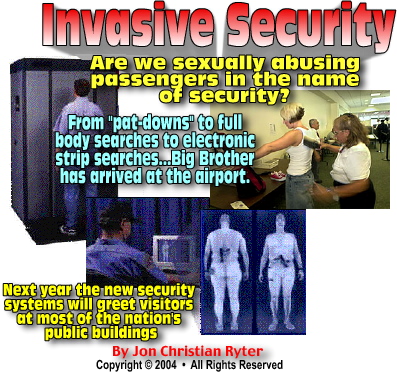
 any Thanksgiving air travelers were shocked as they made their way through the physical "hands on" gauntlet at the nation's airports for the first time since 9-11-04 on Tuesday and Wednesday prior to that holiday, and discovered that in addition to the previous inconveniences of wand searches, being asked to remove outer garments and shoes and, occasionally, having their carry-on luggage searched, now, as an increasingly common occurrence we find airport security physically "frisking" travelers—including pat-downs of women's breasts and both male and female buttocks and genitalia.
any Thanksgiving air travelers were shocked as they made their way through the physical "hands on" gauntlet at the nation's airports for the first time since 9-11-04 on Tuesday and Wednesday prior to that holiday, and discovered that in addition to the previous inconveniences of wand searches, being asked to remove outer garments and shoes and, occasionally, having their carry-on luggage searched, now, as an increasingly common occurrence we find airport security physically "frisking" travelers—including pat-downs of women's breasts and both male and female buttocks and genitalia..jpg) According to Transportation Security Administration [TSA] officials, since the pat-downs are done with the back of the screener's hand rather than their palms and fingers, the screener shouldn't be offending anyone. However, to the victim of this abuse, there is little difference from being "felt up" with the back or front of some stranger's hand. Many of those patted down believe they were groped with the fronts, not the backs, of the hands of the screeners. Many female travelers have either cut back on commercial flying, or stopped flying altogether. A few are even contemplating lawsuits against the airlines.
According to Transportation Security Administration [TSA] officials, since the pat-downs are done with the back of the screener's hand rather than their palms and fingers, the screener shouldn't be offending anyone. However, to the victim of this abuse, there is little difference from being "felt up" with the back or front of some stranger's hand. Many of those patted down believe they were groped with the fronts, not the backs, of the hands of the screeners. Many female travelers have either cut back on commercial flying, or stopped flying altogether. A few are even contemplating lawsuits against the airlines.
.jpg) One traveler, Rhonda L. Gaynler, a lawyer who is a frequent flyer who had just one too many public breast exams, decided to sue. She hired a prominent New York civil rights lawyer, Norman Siegel, who is currently researching the legal grounds for a class action lawsuit.
One traveler, Rhonda L. Gaynler, a lawyer who is a frequent flyer who had just one too many public breast exams, decided to sue. She hired a prominent New York civil rights lawyer, Norman Siegel, who is currently researching the legal grounds for a class action lawsuit. .jpg) More lawsuits will likely be filed over what the TSA claims are "minimal" complaints although they will probably prove to be an effort in futility since the government feit it had a 9th Amendment compelling interest in mandating the pat-downs. The decision to institute the pat-downs was based on the belief of Russian authorities that the two Chechen women who blew up the Russian airliners carried nonmetallic explosives onto the planes. Unfortunately for American travelers, it is not known if the explosives that destroyed the Russian airplanes were hidden in the clothing of the Chechen suicide murderers, if they simply carried the explosives, unimpeded, onto the planes; or, if the explosives were set with timers and were in the cargo holds of the planes. Because the TSA does not know, the pat-downs were authorized by the TSA and are currently being carried out in every airport in the nation.
More lawsuits will likely be filed over what the TSA claims are "minimal" complaints although they will probably prove to be an effort in futility since the government feit it had a 9th Amendment compelling interest in mandating the pat-downs. The decision to institute the pat-downs was based on the belief of Russian authorities that the two Chechen women who blew up the Russian airliners carried nonmetallic explosives onto the planes. Unfortunately for American travelers, it is not known if the explosives that destroyed the Russian airplanes were hidden in the clothing of the Chechen suicide murderers, if they simply carried the explosives, unimpeded, onto the planes; or, if the explosives were set with timers and were in the cargo holds of the planes. Because the TSA does not know, the pat-downs were authorized by the TSA and are currently being carried out in every airport in the nation.
However, if Gaynler and any other women who file lawsuits can prove from witnesses (usually there are scores of them standing around watching the strip searches since, unless the women protest and demand that the screening be done in a private room—and that the person who does the body search (be of the same gender as the traveler) with the screeners using the fronts, not the backs, .jpg) of their hands in the pat-downs—they will likely win a judgment from the airlines or the security company that contracted the screeners.
of their hands in the pat-downs—they will likely win a judgment from the airlines or the security company that contracted the screeners.
Siegel is weighing not only whether or not the case is winnable, but also whether it is actionable against the federal government since the government must allow him to sue before their allegations are actionable against the TSA—even though Siegel will argue the pat-downs constitute an unreasonable search and violate the 4th Amendment. Since the TSA believes the pat-downs are in the nation's interest—and are therefore protected under the 9th Amendment—it is unclear which way a liberal federal judge would weigh in on this fray—and what an appellate court would say in rebuttal. Clearly, Siegel's target in attempting to file a class action suit is either the airlines, the airport authorities which allow the pat-downs, or the security companies which are conducting them—or all three.
The government contends that the pat-downs and partial strip searches not only in the United States, but with our European allies, has netted tons of contraband, including a variety of weapons and utensils that 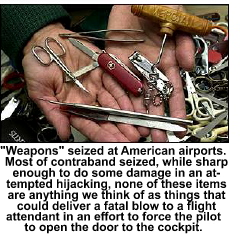 could easily be used as weapons...and, a considerable amount of illegal drugs that people had stupidly concealed on their bodies as they attempted to take their "mood enhancers" with them on their trips so they wouldn't be faced with the dangerous task of trying to buy marijuana or cocaine in a foreign environment where they would be suseptible to being caught in a police sting.
could easily be used as weapons...and, a considerable amount of illegal drugs that people had stupidly concealed on their bodies as they attempted to take their "mood enhancers" with them on their trips so they wouldn't be faced with the dangerous task of trying to buy marijuana or cocaine in a foreign environment where they would be suseptible to being caught in a police sting.
Most travelers, male and female alike, are not aware of the TSA policy that "...screeners are to use the back of the hand when screen sensitive body areas, which include the breasts (females only), genitals and buttocks" and may not.jpg) realize they have legally been sexually abused if the screener cups their breasts or touches their genitalia with the palms of his or her hands.
realize they have legally been sexually abused if the screener cups their breasts or touches their genitalia with the palms of his or her hands.
Since new procedure was put into place, the TSA received over 250 complaints. TSA officials claim the number of complaints are "...trending downwards," and that they received far fewer complaints within the last few weeks. With as many as 15% of the approximately 2 million daily flyers getting the new "pat-down," it is unlikely that the complaints are trending downward regardless what TSA spokeswoman Amy Von Walter says. From week one, Von Walter said, the complaints tricked to only 11 the second week—down from 45 the first week. However, since only about 10% of those who feel violated will complain, we can assume the number of "palm of the hand" assaults is probably closer to 2,500 women than it is 250 women.
Jen McSkimming, the manager of a domestic airlines, was attending an industry meeting on the subject of airport security when those in attendance began discussing the pat-down policy. "Well," the TSA official said, "I only get about 15 complaints a week on this." McSkimming told the New York Times that she looked around the room at the 30 or so people in attendance and noticed that about half of them were women. She asked how many of the women had a bad experience with the TSA's new pat-down policy. "Every single woman," she said, "raised their hand. So, I told him, 'Well, you'd better add 15 to this week's total.'"
Most of the women interviewed by the New York Times for a feature article on pat-downs, said they didn't lodge any formal complaints believing it would be an effort in futility to do so. Heather Maurer, a Washington, DC business executive received her "cheap feel" at Logan International Airport in Boston. Although she and several other women with whom Maurer said she had spoken were very offended by the pat-downs, all of them were reluctant to go on the record by filing a written complaint for fear that they would end up on a TSA suspect list and would be singled out whenever they traveled by air. A male screener gave her a full body pat-down, lifted her shirt and looked down the back of her pants. When he did it, she said: "I'm not comfortable having you feel me up." Like most of the women who fly, Maurer was convinced she didn't have a choice—except to give up flying, which was something she can't afford to do.
Nancy Jackson, the president of a global company headquartered in New York said she has also learned not to express her objections to the pat-down. "If you do," she said, "they really feel you up. And then [they] check every section of your wallet and every item in your carryon, including your makeup and toiletries. It's disgusting."
Lu Chekowsky, an advertising executive from Portland, Oregon is another reluctant flyer now. She's been felt up so many times she now wears baggy trousers, flip-flops, and an oversized sweat shirt when she travels to make the pat-down get over quicker. "Routinely," she said, "my breasts are being cupped and my behind is being felt. I feel I can't fight it. If I say anything, I picture myself being shipped off to Guantanamo."
.jpg) Tony Award winning actress and singer Patti LuPone claims she was also the victim of an airport screener who went too far. Like Maurer, Chekowsky and thousands of other men and women, LuPone was flagged for special attention at the Fort Lauderdale, Florida airport. The male screener asked her to remove articles of clothing. LuPone said she removed her leather jacket, her belt and her shoes because they contained metal which could have triggered the metal detector. The screener told her to take off her shirt.
Tony Award winning actress and singer Patti LuPone claims she was also the victim of an airport screener who went too far. Like Maurer, Chekowsky and thousands of other men and women, LuPone was flagged for special attention at the Fort Lauderdale, Florida airport. The male screener asked her to remove articles of clothing. LuPone said she removed her leather jacket, her belt and her shoes because they contained metal which could have triggered the metal detector. The screener told her to take off her shirt.
"If I take off my shirt," she explained, "I'm going to be exposed." Since LuPone was wearing a see-through camisole, she knew if she took off her shirt, she would be concealing absolutely nothing. The screener seemed to understand. He nodded, saying, "Okay." When she passed through the metal detector without incident, he flagged her for a secondary screening. "What am I doing here?" she asked him.
"You said you wouldn't take your shirt off," he replied. LuPone said she told the New York Times, at that point, she wondered—am I in the time-out chair?
Still in view of the other air travelers who were checking in, she removed her shirt and asked the screener what he wanted next. He did not reply. Instead, a female screener appeared and began to pat her down. According to LuPone, "...this woman comes and starts to give me a breast exam—not using the back of her hands, using the palm of her hands." LuPone said she was shocked by what was happening to her. "I was not in a private environment. I was out there in the public, and totally taken by surprise, humiliated and shocked." LuPone, whose breasts were deliberately exposed by the screener because of his orders—backed up by his badge, has grounds to sue because the female screener touched her breasts with the palms of her hands and her fingers.
.jpg) Congressman John Mica [R-FL] seems to think this is just a minor inconvenience that Americans should be able to tolerate for a short time "...until we get the technology [in place]. I know it's not pleasant," he said, "but what are the options?" The TSA is currently testing machines that will eliminate, or greatly curtail, the use of pat-downs. The experimental unit is machine that blows puffs of air at passengers in order to grab and detect trace molecules of explosive materials dislodged by the air puffs. (Whether or "Puff-the-Magic-Dragon-Detector" is ever approved is irrelevant since the system that will be mandated nationwide is the Secure 1000 Body Scanner.) As Mica noted, until a failsafe high-tech system of some type is approved and all airports are equipped with an effective electronic deterent, the pat-downs will continue.
Congressman John Mica [R-FL] seems to think this is just a minor inconvenience that Americans should be able to tolerate for a short time "...until we get the technology [in place]. I know it's not pleasant," he said, "but what are the options?" The TSA is currently testing machines that will eliminate, or greatly curtail, the use of pat-downs. The experimental unit is machine that blows puffs of air at passengers in order to grab and detect trace molecules of explosive materials dislodged by the air puffs. (Whether or "Puff-the-Magic-Dragon-Detector" is ever approved is irrelevant since the system that will be mandated nationwide is the Secure 1000 Body Scanner.) As Mica noted, until a failsafe high-tech system of some type is approved and all airports are equipped with an effective electronic deterent, the pat-downs will continue. 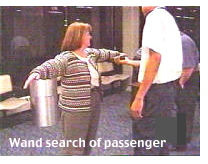 That's why graduate student Sommer Gentry, who said male screeners at Logan International Airport tried to pat her down while a female screener at BWI tried to shove a handheld metal detector between her legs, making her a permanent ex-frequent flyer.
That's why graduate student Sommer Gentry, who said male screeners at Logan International Airport tried to pat her down while a female screener at BWI tried to shove a handheld metal detector between her legs, making her a permanent ex-frequent flyer.
Very soon the techbology Mica spoke of will be installed in all the nation's airports. And, it is a less intrusive devise. Less intrusive in the sense that screeners will not need to physically touch the traveler to determine .jpg) if they have anything concealed on their body since the new devise is a very high tech X-ray machine called the Secure 1000 scanner. In 6-seconds it does a complete 360 degree scan of the human body.
if they have anything concealed on their body since the new devise is a very high tech X-ray machine called the Secure 1000 scanner. In 6-seconds it does a complete 360 degree scan of the human body.
Steve Smith, the inventor of the X-ray scanner (called the Secure 1000) admits that privacy will be the primary issue. Promoters of the X-rayscanner, however, would have travelers believe that it is not much different than the X-ray machine your local hospital uses.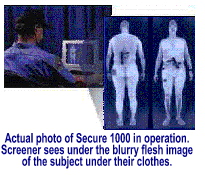 The image the screener will see, they would have you believe, is about the same as the image viewed by the hospital's X-ray technician and your doctor. Not true.
The image the screener will see, they would have you believe, is about the same as the image viewed by the hospital's X-ray technician and your doctor. Not true.
The new devise simply peers through your clothes, not under your skin like a medical X-ray. It will be almost as t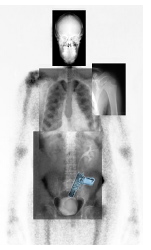 hough you are walking through the metal detectors naked—except the finite body "details" will be "fuzzy." What shows up on the screen is a naked human form. Blurry images of male genitalia will be visible as will the cleft in the buttocks. Also visible will be anything that is concealed on that person—coins in the pockets, metal zippers, metal or ceramic knives, guns, explosives and, yes, drugs. X-ray scanners have been used in England for about a year. But, then the English are not quite as prudish about their bodies as the Americans.British authorities were so pleased with the success of the Secure 1000 that they are now installing them in police stations and jails throughout that country. It has proven to be the most successful method for discovering
hough you are walking through the metal detectors naked—except the finite body "details" will be "fuzzy." What shows up on the screen is a naked human form. Blurry images of male genitalia will be visible as will the cleft in the buttocks. Also visible will be anything that is concealed on that person—coins in the pockets, metal zippers, metal or ceramic knives, guns, explosives and, yes, drugs. X-ray scanners have been used in England for about a year. But, then the English are not quite as prudish about their bodies as the Americans.British authorities were so pleased with the success of the Secure 1000 that they are now installing them in police stations and jails throughout that country. It has proven to be the most successful method for discovering 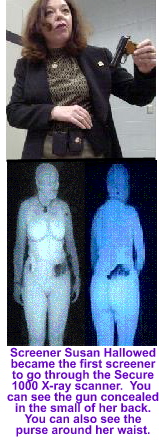 contraband on prisoners, and for conducting whole body searches with what they believe to be the most non-invasive searches of detainees. The only thing that Secure 1000 cannot see is any contraband or explosives that can be stored wholly within the vagina or rectum.
contraband on prisoners, and for conducting whole body searches with what they believe to be the most non-invasive searches of detainees. The only thing that Secure 1000 cannot see is any contraband or explosives that can be stored wholly within the vagina or rectum.
Secure 1000 was ready for use as the world's most technically advance security system shortly after 9-11, but threatened lawsuits from the American Civil Liberties Union [ACLU]—which viewed it as far too intrusive and therefore, a violation of American civil rights—stopped Congress and the TSA from universally adopting the scanner for use not only in the nation's airports, but as the first line of security defense in all government buildings in the United States. But, it was not until England began reporting tremendous success using the Secure 1000 that the TSA tested it in 15 of the nation's largest airports.
Screener Susan Hallowed agreed to be the TSA's first American guinea pig to prove to women that the Secure 1000 really doesn't "strip you naked." 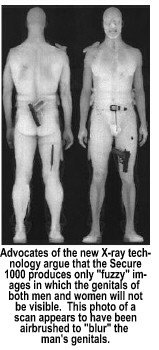 Carrying a handgun concealed on her body, she walked through the x-ray scanner. (Pictures—right, above). Not only did the scanner "see" the handgun hidden in the small of her back, it also spotted the purse around her waist and what appears to be a cell phone under her jacket on the right. When this system gets up and running, it will replace the human hand pat-downs and the embarrassment women feel being touched by people they don't know, and will be replaced by being seen "fuzzy" naked by people they don't know.
Carrying a handgun concealed on her body, she walked through the x-ray scanner. (Pictures—right, above). Not only did the scanner "see" the handgun hidden in the small of her back, it also spotted the purse around her waist and what appears to be a cell phone under her jacket on the right. When this system gets up and running, it will replace the human hand pat-downs and the embarrassment women feel being touched by people they don't know, and will be replaced by being seen "fuzzy" naked by people they don't know.
It's clear we have not gotten a single iota smarter since 9-11. If anything, we've gotten even more stupid. Because of political correctness and a fear of the ACLU and several Islamic lobbying groups, TSA issued instructions to seek out terrorists from the ranks of grandmothers, well-known non-Muslim entertainers, middle class white Christian travelers, and others who do not fit the profile of a terrorist as we know them to be in this country. Screeners at airports take care not to set anyone apart for secondary security checks if they appear to be of Mideastern origin. 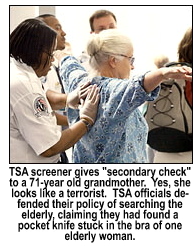 So, if you want to avoid the hands-on security check, just put a red and white checkered tablecloth on your head, tie it in place with a piece of clothesline, tattoo "praise be Allah," on your forehead or hand, and you are almost completely assured that you will be passed through the screeners' gauntlet without a second glance.
So, if you want to avoid the hands-on security check, just put a red and white checkered tablecloth on your head, tie it in place with a piece of clothesline, tattoo "praise be Allah," on your forehead or hand, and you are almost completely assured that you will be passed through the screeners' gauntlet without a second glance.
But anyway you look at it, it's very likely the "cheap feel" conducted by airport contract employees under the guise of making travel safer for Americans might end up becoming very expensive for the airlines and/or the security contractors who perform the screening searches for the TSA if Siegel's class action lawsuit gains legs. Let's get rid of the nonsensical "feel good" security at the airports and start targeting those who history has shown intends to harm the people and the infrastructure of the United States. Whether Mideastern, Asian, African, European or American, those who intend to wage Jihad in America are Islamists. We need to start profiling them. No one's going to care if overzealous screeners at LaGuardia, or BWI or Logan Airport strip search someone linked to Osama bin Laden or al Qaeda. In fact, if that happened, Americans would not mind the humiliation they must endure a the hands of TSA screeners when they decide to fly somewhere.
When you look at the furor over the pat-downs or "feel ups" (the choice of the terminology that best describes the act is best left to the passengers who endured the embarrassment of a full body search either because they were randomly selected by an airport screener, or they failed to clear the metal detector at the airport check-in—or thinking about being fondled by either a man or woman screener they never saw before, the passenger becomes nervous and triggers false warnings to the screener who suddenly suspects that person may have something to hide.
In hindsight, however, it appears that perhaps the only people with something to hide are those within the TSA and the Department of Homeland Security who knew all along that the system that would ultimately be used to secure America's airports would be the Secure 1000 scanner system.I believe they very adroitly used a Hegelian principle to convince the nation that a very intrusive X-ray system that can simply peel back the layers of clothes people wear and peer underneath was not as bad as the alternative. When the cure is bad, create a disease that is even worse. The "disease," of course, were the pat-downs which allow airport screeners (and those guarding America's increasingly vulnerable public buildings) to innocuously caress the sensitive parts of the bodies of both men and women. The "cure" is the Secure 1000 which, suddenly, does not seem to be all the bad when compared with the only alternative. Today, airport security in America mandates what is increasing becoming very offensive with travelers: pat-downs, and when necessary, the partial disrobing of passengers before they are allowed to board planes. Tomorrow, the TSA will offer travelers a less offensive alternative that will bring sighs of relief to the traveler: the Secure 1000. From the airports, the Secure 1000 will become a fixture in every federal office building within another year, and from there, into every State and county courthouse within the next two or three years.
And, when the public complains about the intrusiveness of being electronically disrobed whenever they go to court to pay a traffic ticket, or to pay their taxes, some woman—remembering the airport pat-downs, will comment, "Well, it sure the beats the dickens out of being felt up by a five-and-dime make-believe cop with a license to grope you." Not only is Big Brother watching...he now has X-ray eyes.

Copyright © 2009 Jon Christian Ryter.
All rights reserved.


